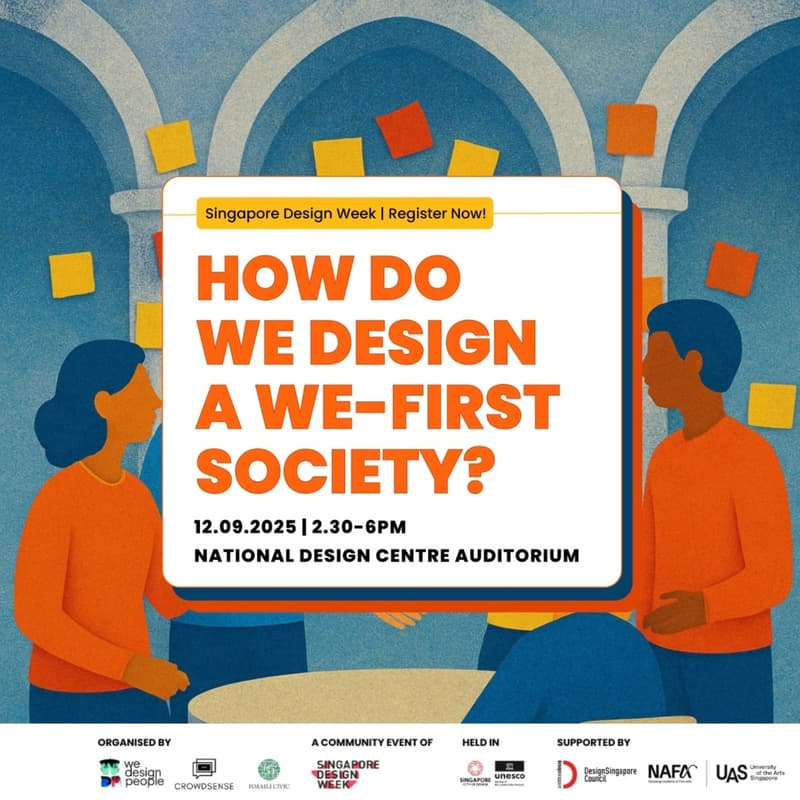

Impact by Design Unconference
What does it take to design a “we first” society?
Join us for Impact by Design, a participatory unconference, where members of the public, designers, artists, and community builders come together to imagine how design can shape a more caring, inclusive, and future-ready nation.
As Prime Minister Lawrence Wong has reminded us, Singapore must work towards a “we first” society -looking beyond self-interest to strengthening bonds with one another. This unconference is your space to turn that call into collective action.
Key themes and guiding questions:
Care: How might we create a “we first” society? What “heartware” and hardware are needed?
Inclusion: How might we design spaces and systems that welcome and empower everyone?
Future-ready: How might we design for strength, adaptability, and long-term community well-being?
Possible discussion areas include:
Climate change and sustainability
Active aging, healthcare, and caregiving
Youth and advocacy
Urban planning and placemaking
Social entrepreneurship
What makes this different:
Unlike a traditional conference, an unconference is informal, participant-led, and co-created in real time. There are no fixed panels or keynote speakers. Instead, participants set the agenda—proposing topics, leading conversations, and shaping the experience together!
By the end of the Unconference, we aim to:
Surface community values and aspirations for impactful design
Spark meaningful cross-sector dialogue and collaboration
Seed ideas for future ground-up or passion projects
About the organizers:
Lewis Liu has over a decade of experience spanning the public, private, and non-profit sectors. He specializes in helping organizations engage stakeholders, identify emerging trends, and develop long-term strategies. He spent half his career in the Public Service (PMO, MCCY), supporting futures thinking and citizen engagement initiatives. At Grab, he worked closely with policymakers and regulators to improve the lives and livelihoods of gig workers and consumers.
Lewis is an Executive Education Fellow at the Lee Kuan Yew School of Public Policy, NUS.
Today, he leads Crowdsense, a consultancy dedicated to bringing diverse stakeholders together to work toward shared goals.
Radhika Agrawal is an independent service and transformation designer with over 6 years of experience across UX research, product strategy, innovation and training, helping organizations reimagine experiences for people and communities. She is now the founder and creative lead of WeDesignPeople, a global creative lab exploring creative transformation and the democratisation of design for individuals and teams through art, play, emotional design and collaboration.
A graduate of the Royal College of Art and a scholar at IMDA, Radhika’s work spans across Asia, Europe and the US, with clients such as Thoughtworks, Grab, Ministry of Health, UAS Singapore, DSG and many more. She believes in creativity being the key to a more authentic and innovative society, and with an inside-outside approach, aims to bring the experience to every Singaporean.
Akbar is an urban sustainability practitioner, merges entrepreneurial acumen with consulting experience for societal impact. With startups in yacht and property management, he applies ESG best practices, prioritizing resource efficiency and circularity to reduce environmental impact.
With a Masters in Urban Data Science, Policy, and City Planning, he engages in advisory work to catalyze impact with tri-sector and international relations to shape strategies for smart cities, highlighting climate (heat mitigation and adaptation) and social resilience (ageing and the vulnerable). Leading Ismaili Council for Southeast Asia’s outreach (Ismaili CIVIC) with a focus on environment x well being and culture.
About communityize
communityze is a collective of community designers, researchers, placemakers and artists in Singapore that advocates community design for the social good, to foster collaboration, amplify diverse voices, and build shared resources to empower communities, elevate the profession, and shape a more participatory and equitable future.